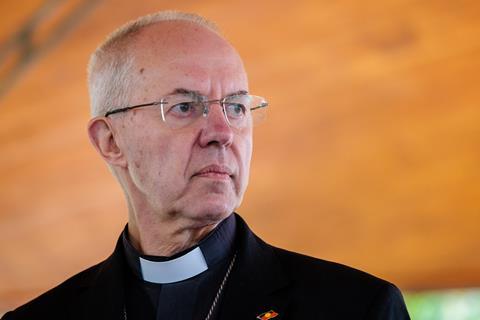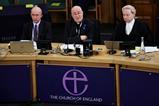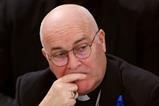Church of England bishops are finalising proposals in response to same-sex marriage for February’s meeting of the General Synod. Could Bonhoeffer’s seminal text on Church unity help as decisions on sexuality are made?

I am a fan of the Church of England’s breadth. At its best, it means the opinions of the most card-carrying evangelical can be enriched by perspectives from the Church’s catholic wing, and vice versa. I believe we would be an impoverished Church without such cross-pollination.
The work of Dietrich Bonhoeffer is widely respected across this spectrum of Anglican diversity. His resilient and self-sacrificial faith in the face of Nazi persecution inspired many; his work on Christian unity, written as world war two began, has been widely admired.
Indeed, Rev Dr Sam Wells, vicar of St Martin in the Fields, London, has called his book, Life Together, “possibly the finest handbook available to Christians of how to live as the body of Christ”.
For Anglicans, living together in unity is proving challenging, not least when it comes to offering a coherent and compassionate response to contemporary sexuality. Several bishops have made their views clear already, but Most Rev Justin Welby, Archbishop of Canterbury, is keeping his opinions to himself. He told The Times newspaper that while his view had not changed, his role was to be a source of unity.
In the face of Welby’s silence and other’s outspoken opinions, I wonder if Bonhoeffer’s text might offer fruitful inspiration for deliberating bishops.
Better together
When one thinks about the debates on sexuality thus far, one might conclude that the Christian emphasis on “do not judge” has often been side-lined, as one part of the Church criticises another. Bonhoeffer names the temptation to think in terms of issues instead of people, and thus be seduced by self-justification.
I dare to believe in a unity which is true to scripture and honours the dignity of all
Instead, he underlines that a Christian community is dependent on the fact that everyone is indispensable: “not only do the weak need the strong, but also… the strong cannot exist without the weak”.
Inclusivity of community is Bonhoeffer’s primary concern. After all, he opens the book with Psalm 133:1: “How good and pleasant it is for brethren to dwell together in unity!”
Drawing the boundaries
But what are the boundaries to this unity? It’s one question progressive campaigners can be reluctant to answer. The Bishop of Oxford has argued that the Church’s teaching on marriage should change because it is out of step with society; but he isn’t arguing that the Church aligns itself with those advocating polyamorous unions. He is arguing for a different drawing of a moral line, rather than an inclusivity which means no moral lines at all.
Bonhoeffer, for all his emphasis on the attractiveness of an inclusive community, is also clear that it should be built on a firm scriptural foundation, lamenting that, in his generation, the scriptures are not known as in previous ones. He asks: “How, for example, shall we ever attain certainty and confidence in our personal and church activity if we do not stand on solid biblical ground?”
Christian communities must be places where the reality of sin is neither ignored nor exaggerated
He then writes: “How often we hear innumerable arguments ‘from life’ and ‘from experience’ put forward as the basis for the most crucial decisions, but the argument of Scripture is missing”.
In the debates about gay marriage, or the blessing of same-sex unions, the absence of a positive scriptural ethic for sexual activity outside male-female marriage provides a particular challenge for those seeking change. Bonhoeffer is clear in his critique of those whose appeals to experience point “in exactly the opposite direction” to scripture.
Reproof and rebuke
Later, he considers territory which is not always at the forefront of polite Anglican discourse: the place of reproof and rebuke: “Where defection from God’s Word in doctrine or life imperils the family fellowship and with it the whole congregation, the word of admonition and rebuke must be ventured.”
The discussions of the College of Bishops are never made public, except via strictly factual press releases, so one can only speculate about whether they ever seek to rebuke one another.
But as many within the CofE realise, the stakes in relation to future unity are currently very high, and a wide range of potential outcomes remain on the table – some of which would represent a clear departure from the kind of firm foundations Bonhoeffer commends.
Although Bonhoeffer’s focus remains profoundly pastoral, his approach is not devoid of personal challenge; Christian communities must be places where the reality of sin is neither ignored nor exaggerated: “Nothing can be more cruel than the tenderness that consigns another to his sin. Nothing can be more compassionate than the severe rebuke that calls a brother back from the path of sin.”
Holding together
Ultimately, Bonhoeffer is candid about circumstances which would merit a formal separation within the Church, and he expresses this as humble service rather than arrogant judgement: “We have no charge but to serve our brother, never to set ourselves above him, and we serve him even when we must speak the judging and dividing Word of God to him, even when, in obedience to God, we must break off fellowship with him.”
English Anglicans might well look to the experience in the United States over the last 20 years, to realise the impact of decisions that result in a denomination no longer being able to hold together.
I hope and fervently pray that the CofE can move forward in loving unity; I dare to believe that it is possible for this to be a unity which is true to the call of scripture, and that honours the dignity of all people made in the image of God.
The bishops face daunting challenges. As they seek a way forward, perhaps Bonhoeffer’s desire to hold together radical inclusion and biblical faithfulness is worthy of reflection. He offers wisdom for our time.





































